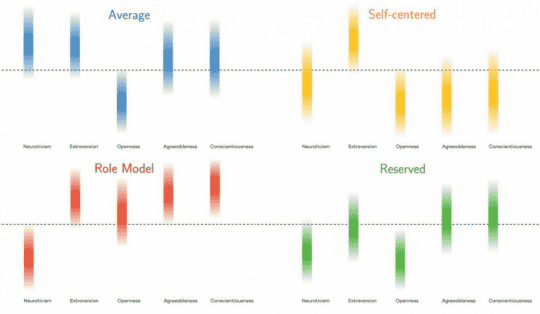Research results that human 'character' can be classified into 4 clusters

Human nature is diverse, but research results that "there are four remarkable clusters" were announced. By analyzing a large amount of research data so far by machine learning, it seems that a new way of classifying personality has been found.
A robust data-driven approach identifies four personality types across four large data sets | Nature Human Behavior
https://www.nature.com/articles/s41562-018-0419-z
Scientists determined four personality types based on new data: Comprehensive data analysis dispels established paradigms in psychology - ScienceDaily
https://www.sciencedaily.com/releases/2018/09/180917111612.htm
Are These Four Personality Types for Real?
https://www.livescience.com/63613-are-personality-types-legit.html
Based on experimental data for diagnosing the person's "personality" collected from a large number of subjects as far as 1.5 million people, research teams such as Martin Garrak of Northwestern University, etc., using a machine learning algorithm I investigated ways to classify humans according to personality traits.
A classification method called " big five (five factor model) " which distinguishes the character of a person so far was known. In Big Five there are five things to shape human personality: "Neuroticism" (nervousness) "Extraversion" "Openness to Experience" "Agreeableness" "Consinessiousness" It is said to have one characteristic.
In this study, we found that human characteristics can be classified into 4 types of clusters (classification) combining each of the above five characteristics.

· 1: Average (average)
Neuroticism (nervousness) and Extraversion (extroversion) are strongly named "Average", and the score of Openness to Experience (openness) is low. According to Mr. Garrack, there are many people who are more inclined to women than Average.
2: Reserved (quiet)
The personality named "Reserved" is emotionally stable, but it is not a special open. "Feel" has good characteristics of good faith.
· 3: Role Models (exemplary)
In the "Role Models" group, although the score of Extraversion, Openness to Experience, Agreeableness, Consoniousness is generally high among the five factors, only the score of Neuroticism (nervousness) It has the characteristic of being low. Role Models, a so-called "honor student" type, said that human relations are easy and trustworthy. There seems to be many Role Models types in women than men, but everyone seems to be getting more rich in Role Models with age.
· 4: Self-Centered (self-centered)
Although "Self-Centered" has extremely strong Extraversion elements, the elements of Openness to Experience (open), Agreeableness (Harmony), Consianceiousness (Diligence) are somewhat below the average. To put it briefly, I'm a selfish personality, I do not want to get along very well. Both men and women also know that the characteristics of Self-Centered will weaken with age.
In this research, we have succeeded in finding out four characteristic classifications (clusters) that tell the character of a person by data analysis, but "that people do not belong to any one cluster" That is important. "The clusters are like clumps in pancake butter, which means that the density is high in some parts, although there are lumps of flour everywhere, in other words, the clusters of character are continuous." I said.

Furthermore, it is said that the proportion of elements of clusters characterizing personality changes with the passage of time. Role Models are more common in groups older than 40 years than in those under 21 years old. In contrast, Self - Centered seems to be more common in groups under 21 years of age than in groups older than 40 years, Clusters are thought to change as they mature over age.
The discovery of these four personality clusters is "Interesting in showing that the five features of the traditional big five are not completely independent, but that they are functioning as a group," Garack et al thinking about.
Related Posts:
in Science, Posted by darkhorse_log







